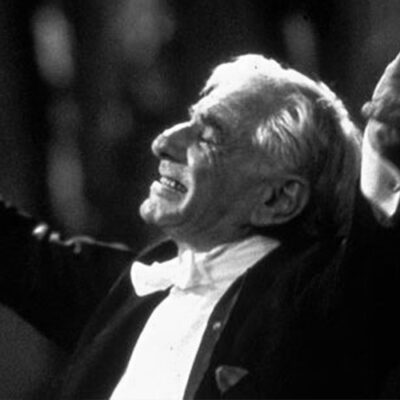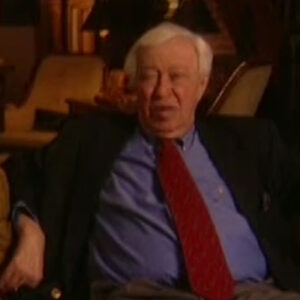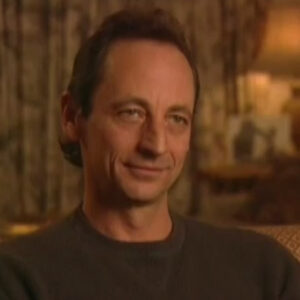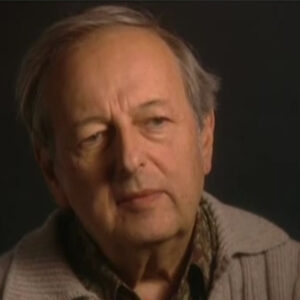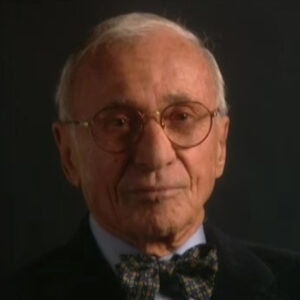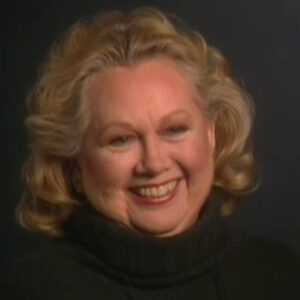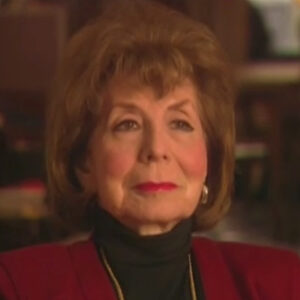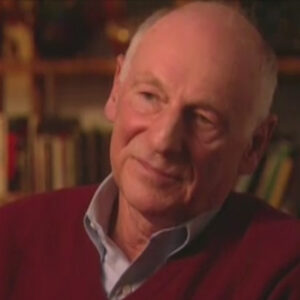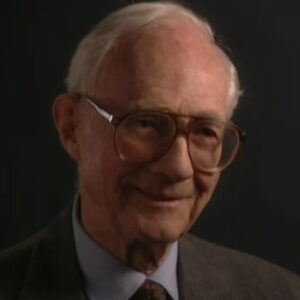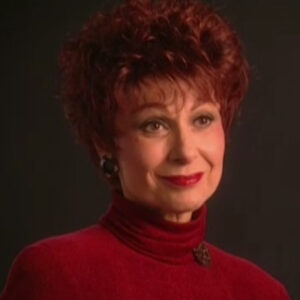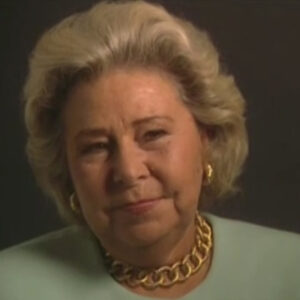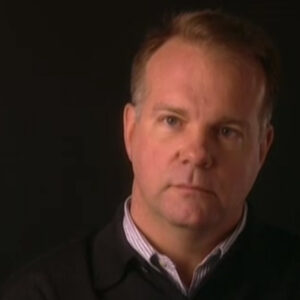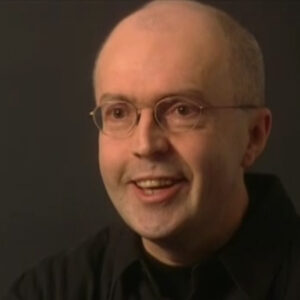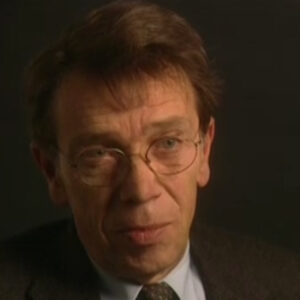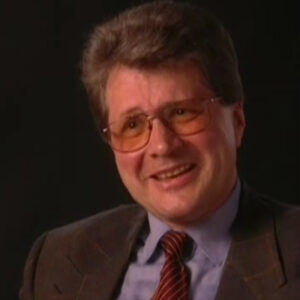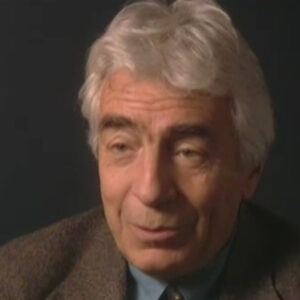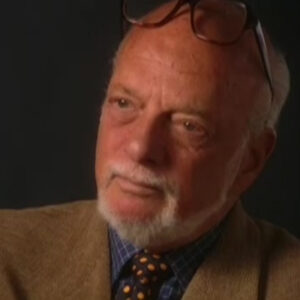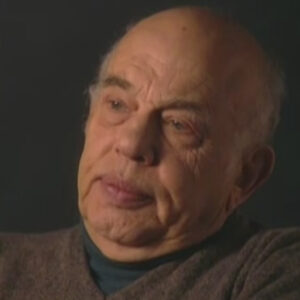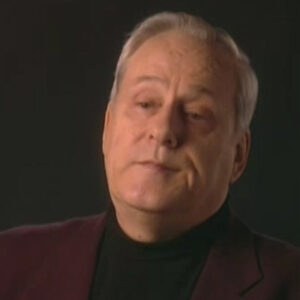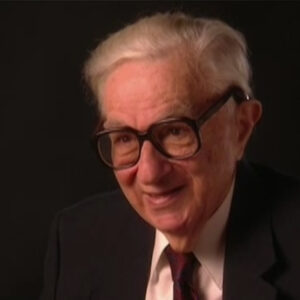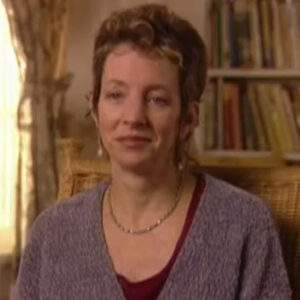Speaker Did you meet, like, the first time when you came to St. Paul’s Cathedral to do the very directly, where had you met before?
Speaker Actually, I mean, as an as a singer. As an artist, yes. But years before, when I was a student and I was starting my career, I was at the conservatory. He was in Mexico City doing some concerns with the New York Philharmonic as the second conductor to Maestro Mitropoulos. So both were conducting and everybody was really I mean, so thrilled about this flamboyant, extraordinary conductor, which was, of course, the know thing. And he was doing an American in Paris. And I could tell you, it was such an unbelievable, unbelievable, thrilling experience, you know, to see I mean, after watching Metropolis in one concert to see Bursten in another one, I mean, the contrast was unbelievable. And I, I, I just saw him backstage. I said just congratulations. I mean, without I mean, he will know who I was and I wouldn’t know then years later I will be working with him, you know, but it was very, very exciting.
Speaker Describe the experience of doing the Requiem in this magnificent cathedral. And what was it like to come in there? What was like for the particular problems of working in that space? What was it like to work with me?
Speaker First of all, the time I was calling the last minute, as you probably know, Franco Correlli was supposed to sing The Requiem, and I was supposed to do a concert in Bucharest in a performance in Bucharest. And they called me, you know, to if I was, you know, free to do in St. Paul’s Cathedral, the Requiem. And I immediately asked the people in Bucharest to let me free. And they were so nice and they allowed me. So I arrived there and I was very, very, very tired about. But he was wonderful. And immediately we started to work. And it was a fantastic relationship, you know, the the way we feel music together. And I, I have two wonderful anecdotes of all the rhetoric. And first of all, you know, there’s some parts of Paul’s Cathedral has an echo and some things when there are.
Speaker Did you have something that you just finished? A sound? Oh, it will be repeated.
Speaker And and I say to my God, what a difficult feeling, you know, because the way the requiem has a very difficult B flat. And he said, come on, Placido. I said, I mean, all it will happen is that the public will enjoy it. Listening nine times to your B flat, you know, with repetition said I said maestro unafraid.
Speaker What I’m worried is if in case I crack, they will hear it nine times also, you know, so we’re laughing quite a lot about that.
Speaker And also in the part of the when it comes this beautiful part in the audio, which is called Comes Arms.
Speaker Mm hmm.
Speaker So it’s in fourth for what I was doing. It’s very piano the way he wants it. And I was doing something like.
Speaker He was it after we finished the course, said, you know what, you said that that phrase I was so taken by said, then you make me make a bar or five, four rather than four because I was just listening to you say it and, you know, it was an extra beat in the bar and said, well, this beautiful never mind.
Speaker So those were the the two beautiful moments on the on this very rare occasion, which, of course, we have the you know, the the television. And, you know, it has been so, such a wonderful, wonderful, wonderful highlight in my career that included piece in the film.
Speaker Oh, wonderful. It’s great to write something this magnificent about the space. Absolutely. Absolutely was.
Speaker You’ve worked with many, many, many different conductors. Was there something different, unique or special about the way Lenny worked as a conductor that is different from other conductors? What’s unique about the way he worked with Solo?
Speaker I think it was his total enthusiasm about music, which in a way is what I feel pretty. It was so absolutely extroverted and really loving every second with the most the deep, deep passion and the rhythms, you know, the rhythms and the diversity of everything. Then I was able to work with him, you know. So I think then he was a very serious musician and really, really great composer also is just a pity. Then he he was not able to do two or three more works, like what’s the story? I think it was just his field. You know, when you hear this monumental work, you really feel sorry that he was not able to dedicate more time to the competition and to do another two or three. I have to say this. His enthusiasm was totally contagious, you know, and I still keep a telegram in my prayers. I, I keep a telegram. I cannot tell you exactly now what I was doing, but he hear me doing something on television and spontaneously he send me a telegram saying how much he loves the sound of my voice in that particular evening, you know, so I keep it with me because it is I mean, it’s something to cherish.
Speaker Oh, I’ve read some letters he wrote that he loved working with them. It is. I don’t think he would have like he wanted you for the recording of West Side Story.
Speaker Yeah. It was just a little a little problem with with schedule. You know, at first he wants me. Then he thought logically, I mean, he has found an American tenor, which obviously the part of Tony is much better. If you have an American, you know, the voice, the sound, the accent, you know more not me. I mean, the normal one, you know, rather than in Spanish singing. But unfortunately, after he changed his mind again and they asked me what I was, I was then back. I couldn’t do it, you know. So my good colleague and great friend, a career started and they had a little bit difficult together.
Speaker But what why do you think he do you think it was a kind of a tough question, but do you think that was a well conceived idea for the West Side Story with opera singers that everyone did?
Speaker Well, the thing is this. Let’s let’s face it. Aha. I without criticizing because I mean, I am a great admirer of my colleagues and inquiry and who say they are extraordinary singers and but if I will do it and I will do it also with the soprano.
Speaker Probably it will be something the public would want to have, but probably it wouldn’t be the perfect thing, I should say, that that he needs it needs the musical.
Speaker It needs the kind of voices. For instance, I mean, you start with a low, B flat, which it always you every thought I’d ever know. And then, Maria, also, you have a tremendous decision to go through. So the people then they have a lighter voices than they are more for the musical comedy. They can manage that somehow, especially nowadays, because nowadays the musical comedy is done with microphones. You know, it’s not before it was done really with the real voices. So what can I tell you? I, I like it. I like when I listen to Kurian and to say and I have done also a recording of tonight is the matter of fact, I just did a television program with I sing the duet with Renee Fleming and and probably probably somebody else will say, well, I would prefer something less, less operatic, even though we liked what we tried to adapt ourselves very much into the into the style, you know, but I think than any any piece that has been written. And it could be different, different versions. And this is the the beautiful, the versatility, the then you can have your own choice. You know, for somebody, that recording could be the the absolutely utmost. And other the people will say that, you know, I mean, people always critics always tend to to put you down whenever you go, you do something that is crossing over, you know, I mean, like, for instance, if I will sing or tangos or missing Mexican songs and they will said, oh, that’s awful. This is the music then I used to sing before I sang opera. You know, I know this music and I know the style, the style perfectly well, you know. So it’s something that I can do. But just the fact that you are attacking something, then it is crossover. Say no, no, leave it alone. You’re singing the opera. So some things you can do right. Some things you can do wrong. But the important thing is that they exist, these different versions, and they are there for the public to the side and to to see what to to say to what they like it.
Speaker Apart from West Side Story, are you familiar with any of song compositions that I’m familiar with?
Speaker Candide, definitely. I’m I hear also his mass and also the what is the this one.
Speaker Just think of the Santo Domingo. It is it is another kind of musical. It is it is something I cannot tell you exactly that it’s not it is. It is. It is a whole work.
Speaker There’s a whole work. I don’t know what I would do.
Speaker Yeah, probably 20, 30 years.
Speaker And I have heard, you know, but of course, the thing that has touched me more, it has always been the the West Side story, you know, and every time you hear that is junior. Junior.
Speaker What was your next experience of working with Larry?
Speaker We’re working on the Beethoven’s Ninth Symphony, which we did it for the fourth anniversary, so of Beethoven. So we did a beautiful also television program. And I was able to to sing again with him, you know, Beethoven and and the only other experience I have, it was recording the Rosenkavalier Cuvelier, the Italian tenor, which I also have an anecdote there. I, I was in this very much Strauss company with crystallography and Gwyneth Jones and Walter very and all the really Strauss cast, which they have done the work so many times and and the Vienna Philharmonic.
Speaker And I think it was also and yes, it was indeed. And then and I just hear my flute before my idea of the Italian tenor, and he makes me.
Speaker He said the most common, so I went in front of the microphone and I sang the aria from beginning to end and it went beautiful, but it really went beautiful.
Speaker And then he said, I said, OK, my boy, that was wonderful, said now let’s recall that apparently the microphones were not open and I was so, so disappointed because I wish in that recording it will be that version, you know, then I got all tied up and OK, I cannot tell you exactly what I don’t obviously, I don’t like it as much as I like the first version than I did. You know, I was uptight. So that was still there. And we were supposed to do a production of Cavalleria Rusticana at the Metropolitan, but it wasn’t a strike. And by the time the strike was over, I was not available. And so in that location, Corelli did the cover for me, just like I did the Requiem for him in the in the occasion of the samples performance of the Requiem. And sadly, those were the only possibilities we were talking about several things. We were talking about doing an Aida and Escala. Once I start doing Lutalo, he was also hoping that we can do Othello. We were talking about Treston. We were talking about well, I was not involved in the Carmen, but then he was conducting. But also somehow I was going to be. So all these things, they never happen. They never happen, unfortunately. And, you know, sadly, very little what I have with him. But those are moments that I will remember forever.
Speaker The response to the Beethoven’s Ninth with. Do you remember that? Yeah. And if you share that with.
Speaker Well, it was it was I mean I mean, if you there is a great, great work. I mean, of course, Beethoven’s Ninth is is a masterpiece for a conductor, you know, with all the chorus and with everything that goes on there, you know, so he has a tremendous, tremendous success. And the success, of course, it was for everybody. So we really we really have an unforgettable evening and what a way to celebrate Beethoven.
Speaker You know, what was it like working with Lenny in rehearsal?
Speaker Um, he was very intense.
Speaker He was very, very intense and very much, very much in the mood of her performance, you know, so when you were rehearsing for him, you you should already give the what you are going to give after because you see him doing it and you just cannot help, you know, so it was and of course, I was very young, so I, I feel all my full of energy, you know, to do it any as many times as as he conceded, you know, when we were rehearsing, you know, so that was that was very much something that I like it, you know, because I, I was learning I was in my way up into a career. So I was very enthusiastic about doing it once and then all the time and all that it.
Speaker Did you spend time when you were working together? Did you spend time socially?
Speaker Them very little. Very little. Because she always you know, I mean, to say it was a it was kind of a tremendous distance in those days, you know? I mean, if it will be in the later part of my career, I probably will spend more time together. But in those in those days, I was a very young singer, you know, and know many possibilities.
Speaker If it was later on, if it was happening this maybe 10 years ago or five years ago, probably we will go for dinner and we will go here and we will go there, you know, but I was in several, several locations, you know, in one of his I don’t remember it was his sixty fifth birthday, sixteenth of sixty fifth birthday. I went there to celebrate with him. It was a big party and I was there with his family and with everybody, you know, I didn’t know that.
Speaker What where was that? Fairfield.
Speaker I think it was it was here in New York. I remember. I don’t I cannot recall exactly what was the place if it was the the Waldorf Astoria, if it was something where they did a special party for him.
Speaker Did you say no? No. I just came out. I have actually I think I think I have a performance or something else. And I came after the performance just to wish him well, you know.
Speaker Have you ever heard the story of. Ladies first, experience with Maria Callas, my muscala know what it is to remind me, maybe I have heard of where he was.
Speaker It was he was the first American to conduct golf and he was called a regular conductor, took ill and I needed a substitute. And she had heard something on the radio. She said, find out who that was. And I wanted to be like, I have never conducted opera in his six days. And apparently it changed our history when people say Zeffirelli says there was before council before this conference.
Speaker And I see because Lenny was able to bring something out to her, the African wonderful.
Speaker And I guess my question is, if you’ve worked with many different conductors and I asked you this before Menasche again, I learned I taught a lot of soloists it like Christopher, making those people who say that that there was something very different about the way many that there was a special connection between learning as a conductor with soloists and trying to see whether there’s something that is illustrative of that. And you talked about music. Was there something beyond that that he was feeling the music and bringing that out?
Speaker Unfortunately, I don’t have enough time or enough occasions to work.
Speaker You know, these occasions where I mean, like, for instance, the Requiem, it was in the last minute, all I did was to arrive, rehearse and go the Ninth Symphony the same day.
Speaker You know, I, I really never had the time to work very, very, very deep with him, you know. So then to go really to the piano and do and repeat and so and so like, I have been, you know, fortunate, lucky enough to to work with other people. I wasn’t, you know, so I can only tell you that his enthusiasm was contagious.
Speaker And as you mentioned, now, La Scala, the idea that I was supposed to do with him, it was for the centenary of La Scala or the centennial featherless gala.
Speaker But after they don’t arrive to, you know, to to finalize the contract or whatever. So I did it with with Maestro Bardot. But it was the lady that was supposed to do it.
Speaker You had to sum up what you think Lenny’s legacy or his contribution to music in this century. What what would you say?
Speaker Well, I think he’s one of the one of the greatest exponents as both as a conductor, as a composer and as a personality altogether. You know, it is what is the charisma and the personality of an artist. That’s something then you cannot describe the people just feel it. And then you just put somebody in a certain position and is there is there. And the public knows that is there. And it is a special person and it is a special artist. And that’s what Bernstein has been for music. He has been one of the great, great, great conductors and great personalities, which it is really very, very important.
Speaker Besides, whatever an artist can do, how he is in the eyes of the public life was unusual in the sense that he would have so many different gifts he can definitely perform pianists. You also have begun to perform multiple functions of conducting and performing the same time. What are the special difficulties that you think accompany an artist who attempts to work with so many different ways?
Speaker Well, there is always some criticism because.
Speaker People, first of all, they they consider you can never judge anybody else possibilities, you carry the weight according with your shoulders. I always say to, you know, are always it will be a criticism. And it has been to every instrumentalist or singer that it tries to start his career. Also, as a conductor, you always have it is always a handicap. The fact that you are a well-known, established singer, you know, and I what can I say it I, I just say it. And I am a musician.
Speaker When you are a musician, you do what you know to do.
Speaker And the only thing is you have to please, of course, the orchestra and you have to please the artist and you have to please the public. So, you know, of course, the critic is very, very important and I respect it very much. But it’s only one more opinion. And they already come a little prepared saying, well, maybe he’s a singer who should conduct, you know, or if he’s a pianist, whity conductor, you know, he’s a cellist. And I don’t have to say names, you know, you know, the to to identify the characters. But it’s very difficult is twice as difficult, you know, until you are accepted.
Speaker And he put on his passport a musician, musician. That’s great. That’s great. Because you just do what you can remember. This is not a big deal to have it here just because you say who who your colleagues who are singing with you in the background.
Speaker I’m singing with me, I believe. Yes, I recall I think it was Martina Rojo, Josephine VXI and Luciano Raymonde in this particular performance authority, Raquin and in the Beethoven Nine in that Ninth Symphony in Vienna. The soprano was Gwyneth Jones. The mezzo was she Leverett and the bass. It was my viola.
Speaker Have you worked with Kristen Wiig since then?
Speaker Oh, yes, we did several things. We did many performances of Don Carlo in Vienna, and I admire her as a complete, complete artist. One of the things I, I deeply sorry is that I was never I never sang Parsifal when she was singing Country. What a monumental country she’s.

